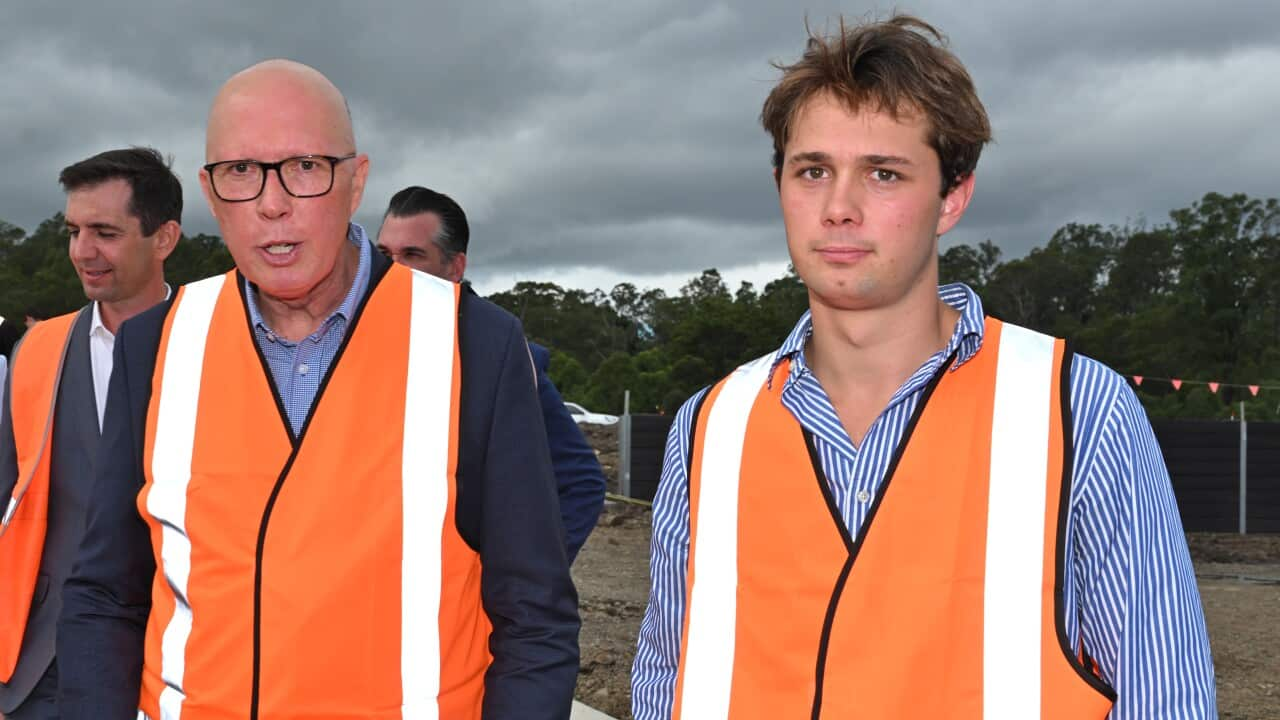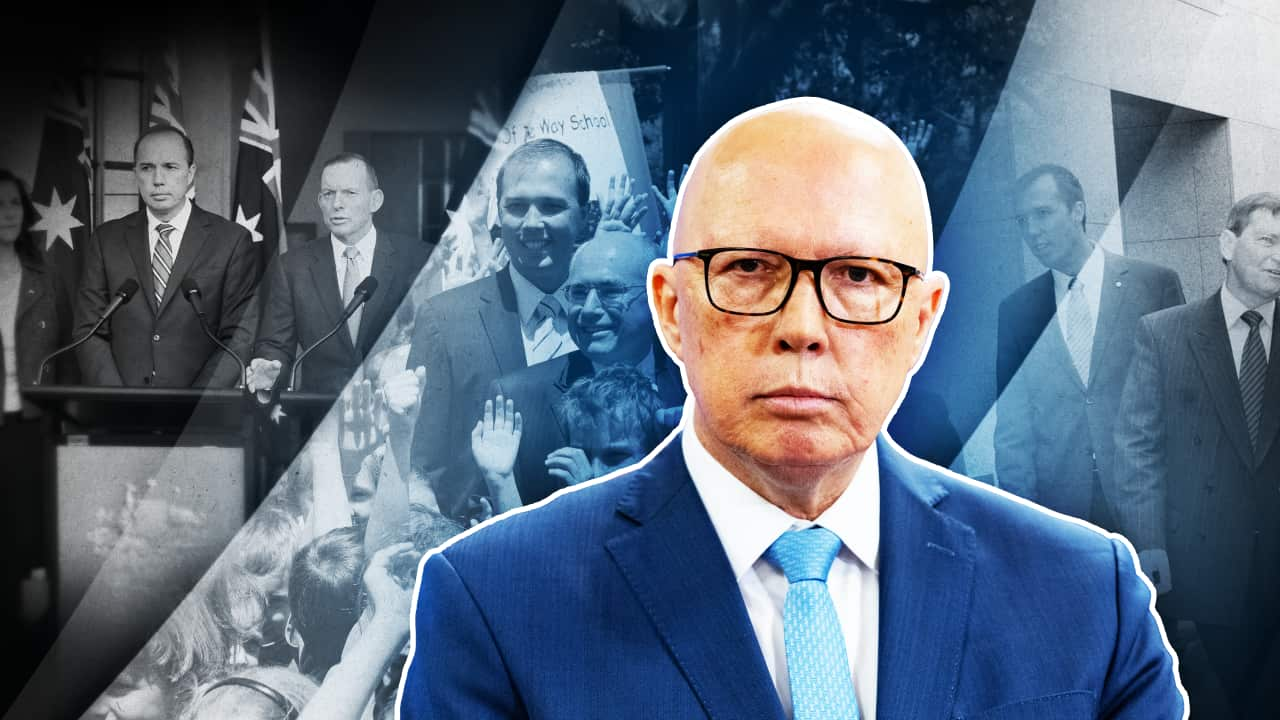Robbie Devine says he considered himself a loyal Labor follower growing up. He describes the political people in his family as left-leaning and his friends as "socially progressive".
But in the past few years, Robbie's views about politics have taken a sharp pivot to the right.
"One thing that was really important was I am a bit of a nationalist," he told The Feed, saying he associates greater nationalism with the right.
"I'm very proud of the country we have. So seeing — what most people would probably call white Australia — but seeing our typical Australian identity being dumbed down, I think as the years go on, is not something I was very keen on."
Robbie has previously been the vice president of the Western Sydney University Liberal Club, and told The Feed he's an inactive member of the Liberal Party.
He said his opinions aren't the most popular in his demographic — according to , gen Z is more progressive than previous generations at the same age.
But he says he's part of a global trend that has seen more young male voters shifting right.
The historic shift of young male voters to the right
At the 2024 US election, young men turned out in force for Republican Donald Trump. Young male voters swung more to the right than they have in two decades, breaking the trend of young people preferring left-leaning candidates.

Young male voters swung more right than they have in two decades in the last US Presidential election in 2024. Source: Getty / Alex Wong
In South Korea, voting preferences between genders in the 2022 election were similar in most age groups, except 18 to 29-year-olds, where the genders split. While 59 per cent of young males voted for the conservative candidate, who eventually won (their support second only to that of voters aged 60 and older), young women under 30 were the least supportive of the conservative leader.
In the 2024 UK general election, almost twice as many young women voted for the Green Party of England and Wales compared to men. Young men were twice as likely to vote for Nigel Farage's conservative 'Reform UK' party.
Similar trends were also found in Germany's election this February, and in Canada, recent polling by Abacus Data in late March suggested that more men than women under 30 backed the Conservatives (41 per cent to 23 per cent).
Hugo Lennon, a 21-year-old Australian political commentator, has attracted 73,000 followers on his TikTok in just over a year by making political content, primarily focusing on migration.

Hugo Lennon, who goes by 'AUSPILL' online, says the Australian political landscape doesn't leave room for discussion about migration. Source: Supplied
"Young white Australians are being partly culturally dispossessed and partly dispossessed from what would otherwise be their national inheritance," he said to The Feed, echoing his online sentiments.
"There's degree inflation [requiring degrees for jobs that don't need them], there's monetary inflation, housing prices are inflated, and we're the generation who are paying for it all."
Hugo is reluctant to put a label on his politics, but says if he had to pick, he is right-leaning and finds the approach of the Liberal Party on immigration too mild. He says it's one of the reasons he was able to capture an audience — because he's having the conversations others shy away from.
Despite this, younger Australians appear more positive about the benefits of immigration than older generations, according to a Lowy Institute Poll from 2019.
Three-quarters of 18 to 44 year olds (75 per cent) say 'immigration has a positive impact on the economy of Australia', compared with the 59 per cent of Australians over 45 years.
"You're so penalised for being right-wing in institutions, on social media, not only are you ostracised, perhaps, but also you risk being de-platformed," Hugo said.
Elon Musk has long been promoting X (formerly Twitter) as a platform with "free speech" since buying it in 2022. Earlier this year, in a bid for greater "free expression" on its platforms — Facebook, Instagram and Threads. TikTok and YouTube's community guidelines deprioritise hate speech as well as other types of content that promote harmful, dangerous or graphic content.
Jordan Knight, a right-leaning commentator online who also focuses on migration, believes there is an appetite for this shift in Australia.
"I speak to new young people every day who are reaching out. But we don't have the political vehicle to express these changes yet," Knight said to The Feed in an email.
"We don't have the new media, new institutions, new political parties or think tanks yet - but green shoots are forming."
Knight said the swing has not been captured yet by a political party, but he believes it will happen.
"The right — the new right — in Australia today will be a youth movement."
While the platforms of Knight and AUSPILL may be growing, young Australian male voters might not follow this global trend.
Australia mirrors the gender gap — but with a twist
With millennials and gen Z overtaking the number of baby boomers voting for the first time in an election, many people are looking to see what impact this "youth vote" will bring.
Some data suggests there is a gender split in Australia too, but not like we've seen overseas.
Long-term trends show young people shifting left, according to Intifar Chowdhury, a lecturer in government at Flinders University, who conducted a post-election study from the 2022 election.
But young women are moving left at a faster pace than young men.
Chowdhury says historically, women used to be more right-leaning compared to men, and it came down to women having higher levels of religiosity.
"What happened in advanced democracies is that women started to participate at higher levels, in higher education, but also in the paid workforce. And that's when they realised that, 'Oh, hey, we are in a weaker economic position compared to men'," she said.
This, she said, led women to favour the redistribution of income and taxing others, skewing female voters to the left.
"It makes sense why men comparatively are less enthused about it or were less enthused about it because with the progression in society, men kind of realised that from becoming a net beneficiary of society, they ended up being net contributors … according to their perception," she said.
Now, crunch this gender perception with the general sentiments of young people feeling less well-off than older generations and you have "a double whammy", Chowdhury says.
"All you need on the supply side is someone to weaponise this discontent, take this grievance and shift the blame to someone else," she adds, saying leaders in other countries, like US President Trump, have fought on ideological lines.
This, however, has not happened in Australia, where she says politics is still fought on issues.
Chowdhury says while Opposition leader Peter Dutton has tried to tap in and test the waters here by emulating the campaigns of other populist leaders, it hasn't quite taken off.
"I think Dutton kind of tried to launch a light version of Trump, but I think very quickly he realised probably Australia does not have an appetite for that yet," she said.
"We're not a very polarised society in Australia. We somehow converge in the middle. We don't like extreme, radical ideas."
Another difference in Australia, she says, is that compulsory voting has helped level out any big political shifts.
"Everyone who's eligible is expected to come and turn out to vote, which means that all those sorts of extreme sentiments get ironed out."
What pushed the global success, and could it happen here?
In the 2024 US election, 1 to 2.6 per cent of voters said they changed their minds about their vote after listening to a podcast, Raffaele Ciriello, a digital innovation researcher at the University of Sydney, told The Feed.
"This effect was particularly strong for Donald Trump. So he went on podcasts like the famous or infamous Joe Rogan Experience, which has an overwhelmingly male audience [with] 80 per cent male listeners," he said.
Ciriello said while polling and data still suggest a left-skew for young male voters in Australia, politicians in Australia are harnessing the same platforms, and while it might not play a big role in this election — it could ramp up in later years.
"Keep in mind that US trends usually spill over to Australia with some years' delay. So if not in this election, then we may see similar trends in upcoming elections."
Chowdhury agrees that while Australia is not tracking for young males to swing right this election, it's not to say it will always be this way.
Keep in mind that US trends usually spill over to Australia with some years' delay.Raffaele Ciriello, a digital innovation researcher at the University of Sydney
"We don't have all the things that are necessary to take it in the other direction yet, but that doesn't mean that it can't go the other way," she said.
"That doesn't mean that we don't have a group of younger men who are being mobilised by anti-system podcasts or anti-woke sentiments, because they are there."
These concerns about polarisation are reflected in the indicators of social cohesion measured by the Scanlon Foundation Research Institute.
They've been mapping social cohesion in Australia annually since 2009 — and Australia scored a 78 in their most recent report, the equal lowest score since the survey began.
The surge in popularity of the right in other countries, particularly the US, has left Hugo (AUSPILL) with mixed feelings.
"Not all the success overseas necessarily translates to positive things here," he said.
Trump's popularity can mean people automatically assume young males who skew right, like himself, have an allegiance to MAGA politics or one party, he says.
"But it also does give a bit of hope where it's like, 'Okay, maybe we put a recipe here for how we can do it [in Australia].'"
Clarification: The story has been updated to add further context. A previous version did not include Robbie Devine's previous role as vice president of the Western Sydney University Liberal Club.





